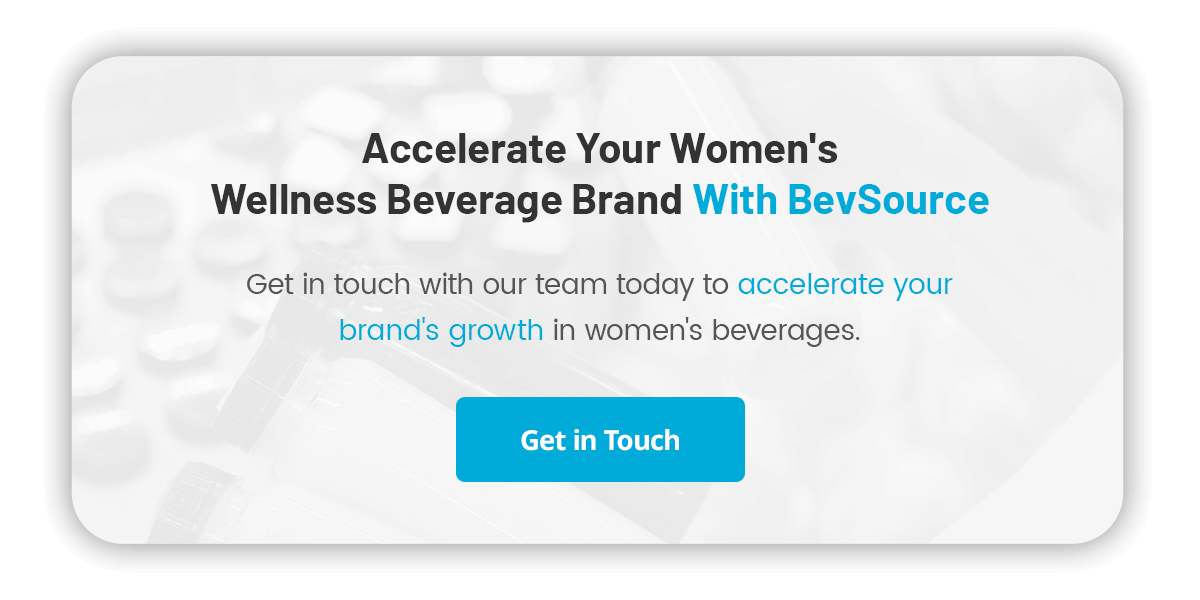Where Women's Health Meets Functional Beverages: Trends, Ingredients and Innovation
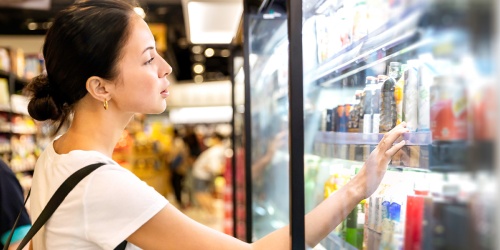
The women's wellness beverage market is growing at a remarkable rate. What started as a niche category with limited flavors and vague medicinal labeling has transformed into a sophisticated space for functional, enjoyable beverages that support women's unique health needs. Women represent the most powerful drivers of wellness demand and the most underserved audience in beverage innovation. Their growing influence is pushing brands to reimagine how drinks can fit into daily routines.
Functional beverages are the natural solution at this intersection of health, lifestyle and convenience. They offer an accessible delivery system for targeted benefits, ranging from hormonal balance to energy, stress relief and focus, without sacrificing taste or ease of use.
This momentum reflects more than a passing trend. It represents a strategic opportunity for beverage brands to satisfy unmet needs by rethinking formulation, flavor and storytelling to deliver measurable benefits in a way that tastes great.
Consumer Behavior Driving the Women's Wellness Beverage Revolution
A top emerging trend in nutrition is the focus on women's health, particularly hormone balance and micronutrient support. Women increasingly see beverages as part of daily, holistic self-care. They expect products to match individual health goals and ethical values.
With women influencing 75% of discretionary spending and beverage purchases, their role as household gatekeepers highlights why this category presents a strategic opportunity for brands. Ingredient transparency, sustainability and proven efficacy are now prerequisites rather than differentiators. These standards are prompting developers to develop functional and credible formulations.
Ingredient transparency, sustainability and proven efficacy are now prerequisites rather than differentiators. These standards are pushing developers to develop functional, credible formulations. Key consumer-behavior trends surrounding functional beverages for women include:
- A holistic wellness mindset: Female consumers look for beverages that support whole-person health, including products supporting beauty, immunity, digestion and mental well-being.
- Rise of precision wellness by life stage: Drinks tailored to different life stages, such as pregnancy and menopause, are moving from niche to mainstream.
- Clean label expectations: Natural and organic beverages for women are becoming more popular. Women are valuing ingredient transparency and overall simplicity.
- Research-driven purchasing: Women often conduct research on ingredients, benefits and potential risks of functional beverages, consulting blogs, health forums, social media communities and expert influencers before purchasing functional beverages. They also seek validation through product reviews and credible third-party sources, assessing effectiveness, taste and suitability for specific life stages or health goals.
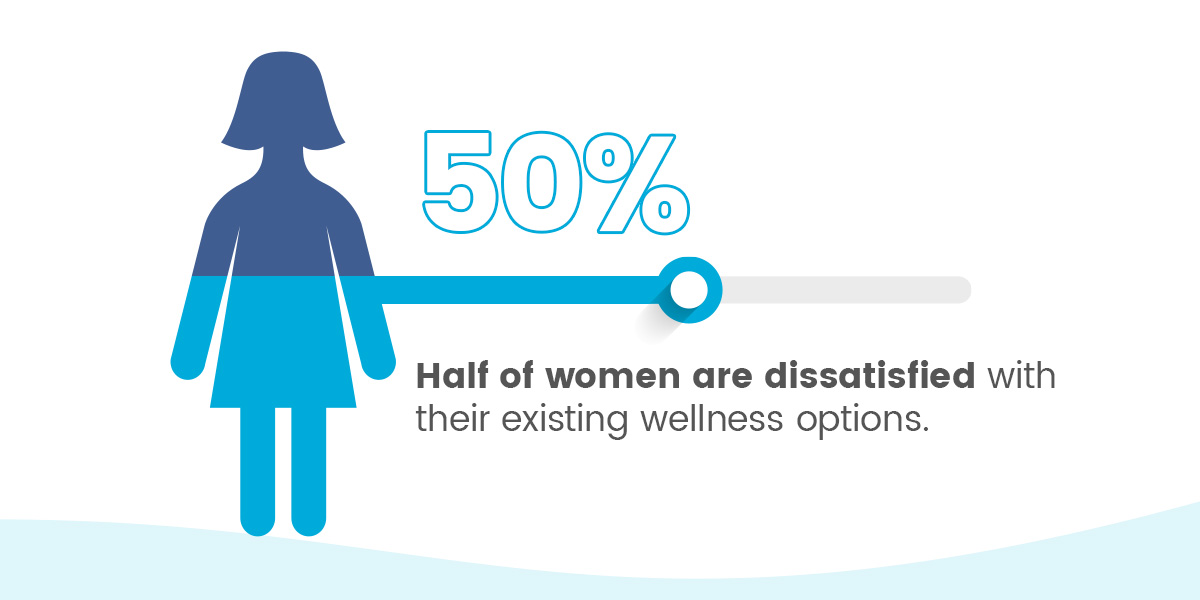
Half of women are dissatisfied with their existing wellness options. Older products make broad claims, offer generic nutrition and miss the mark on balancing function with enjoyable flavors. Women want drinks that align with specific goals such as digestion, stress management or energy, without compromise. Research indicates that 92.3% of women prefer beverages that align with their personal health goals and lifestyles.
Taste, convenience and fortification benefits are nonnegotiable. With fortification, the goal is to add specific nutrients that may be lacking in a person's diet. These beverages may support gut health, pregnancy or specific wellness goals. Functional benefits go beyond basic nutrition. Functional drinks contain biologically active compounds, such as adaptogens, that may improve health or enhance performance.
Companies balancing indulgent taste, evidence-based functionality and seamless convenience are winning loyalty from female consumers who now expect more from every sip.
8 Women's Wellness Beverage Trends Shaping the Market
Women's wellness beverages are moving beyond niche status. Ingredient innovation and community storytelling are turning this category into one of the fastest-moving spaces in consumer packaged goods. Understanding what women value today and how those priorities evolve is critical for building products that earn trust and loyalty.
1. Precision Wellness for Every Life Stage
Precision wellness in beverages means going beyond broad categories to deliver formulations that are finely tuned to specific consumer needs, lifestyles and health goals. Delivering this kind of precision sets offerings apart and creates clearer value propositions for targeted segments.
Health priorities shift throughout a woman's life, and today's female consumers are no longer satisfied with one-size-fits-all solutions. Instead of generic women's drinks, these consumers now look for options designed around their age, activity level and unique nutritional needs.
Active consumers want hydration and recovery support in low-sugar women's drinks. New mothers look for energy and stress relief beverages. Perimenopausal and aging consumers want hormone balance, bone health benefits and cognitive clarity. By matching ingredient profiles to life-stage priorities, beverage brands can transform generic offerings into solutions that feel essential.
2. The Rise of Functional Ingredients for Women's Health
Brands using well-studied ingredients at effective levels can stand out in a crowded market while reducing regulatory and reputational risks.
Adaptogens, nootropics and mood-supportive botanicals, such as passionflower or valerian root, are key additions, helping women manage stress, sharpen focus and support emotional well-being. Increasingly, consumers see these ingredients in women's health beverages as proactive tools for resilience and long-term well-being rather than quick fixes.
A notable example is the rise of adult nonalcoholic tonics and adaptogen-infused aperitifs, with female-forward, narrative-driven branding. Brands like Kin Euphorics and De Soi craft sophisticated, mood-enhancing beverages that offer a sophisticated and health-conscious alternative to traditional alcoholic beverages. These drinks blend adaptogens, botanicals and natural flavors to support relaxation, mental clarity and emotional balance, framing mood and ritual without the drawbacks of alcohol. The experience is equally enjoyable whether sipped solo as a mindful moment or shared in social settings, resonating deeply with women seeking functional, elegant drinks that align with their wellness goals.
Formulating with functional ingredients such as ashwagandha, L-theanine, plant-based collagen and omega-3 fatty acids is also becoming more common in mainstream beverages. Success in this space requires thoughtful ingredient selection and precise dosing to deliver efficacy without compromising taste by avoiding off-flavors.
3. Focusing on Beauty From Within
Consumers are increasingly embracing the idea that true beauty starts from within, turning to beverages that nourish the body while enhancing outward appearance. Pairing functional benefits with indulgent sensory experiences, such as sparkling botanical waters or plant-based lattes, turns products into moments of self-care. Drinkable skincare, popularized by social media, showcases products promising radiant skin and stronger hair from the inside out.
The concept is evolving beyond supplements to beverages. Collagen peptides, antioxidants and hyaluronic acid now feature in drinks or shots that promise to support skin elasticity and hair and nail strength. Products that deliver visible, measurable results while tasting great and fitting seamlessly into daily routines hold the greatest potential to build powerful loyalty.
4. The Clean Label Revolution
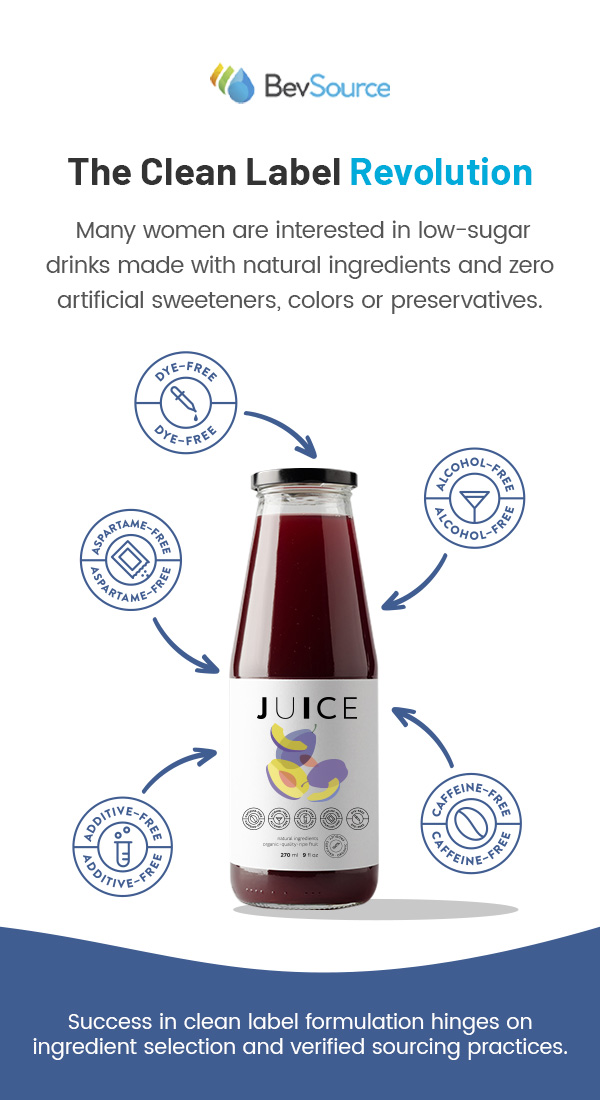
Meeting consumer criteria through panel transparency enables premium pricing and fosters loyalty among health-conscious shoppers. Many women are interested in low-sugar drinks made with natural ingredients and zero artificial sweeteners, colors or preservatives. This reflects the broader desire for wellness delivered in every purchase.
Formulating clean label beverages requires mastering the delicate balance of taste, texture and ingredient transparency from the outset. Consumers expect concise, straightforward labels with recognizable ingredients, but achieving this requires careful sourcing and supply chain transparency to ensure traceability and authenticity. Maintaining an enjoyable sensory experience while meeting clean label standards often calls for innovative approaches, such as using natural sweeteners like allulose, monk fruit and stevia, alongside advanced flavor-masking techniques to mitigate any off-notes.
Success in clean label formulation hinges on ingredient selection and verified sourcing practices that build consumer trust and assure product integrity throughout the supply chain.
5. Hormonal Health Takes Center Stage
Hormonal health is rapidly becoming a focal point in women’s wellness drinks, with social conversations around the topic surging by 118% — a trend largely driven by younger consumers and amplified through social platforms like TikTok and Instagram. Over 87 million women in the U.S. are entering life stages such as perimenopause and menopause, prompting a wave of demand for personalized, functional solutions targeting symptoms like mood shifts, brain fog, sleep disturbances and overall hormonal balance.
Because beverages making hormonal health claims face heightened scrutiny, brands must prioritize transparent communication and credible scientific substantiation to win trust. Product innovations move beyond symptom-masking, now formulating with botanicals like maca and phytoestrogens, adaptogens, and key micronutrients such as magnesium to help support hormonal balance. Millennials and Gen X are driving this shift, seeking products that empower them to proactively manage their wellness throughout every life stage.
With the women's health market projected to reach a value of $68.53 billion by 2030, female-focused products offering rigorously formulated beverages for hormonal support are a significant differentiator. Brands that deliver real benefits through clear labeling, substantiated claims and safe, transparent ingredient choices are best positioned to earn lasting loyalty in this evolving space.
6. Gut Health as the Foundation
Gut health plays a foundational role in regulating mood and hormone balance, with the gut microbiome influencing hormone metabolism and brain signaling through complex gut-brain and gut-hormone axes. Consumers are increasingly aware of the gut-brain and gut-skin axis, leading them to seek beverages that support digestive health as a gateway to overall well-being.
Probiotic and prebiotic beverages, such as kombucha, kefir and fiber-enriched waters, resonate with women looking for functional yet enjoyable products. These products promote digestive comfort and improved mental clarity, appealing to consumers seeking holistic benefits in a single format.
Creating gut health beverages means balancing live cultures or fiber content with taste, shelf stability and transparency. Brands are experimenting with new strains and shelf-stable formats to broaden appeal and reach new channels. Products that credibly combine science-backed ingredients with delicious flavors can become daily staples for women who prioritize prevention and performance.
7. New Formats and Convenience
Busy lifestyles drive demand for convenient drinks. Ready-to-drink (RTD) cans, powdered mixes and on-the-go shots let women effortlessly integrate wellness into their daily routines without extra steps. Portable beverage formats also open up new retail opportunities in gyms, coworking spaces and subscription services.
These formats can also preserve the potency of sensitive ingredients like probiotics, collagen or plant-based actives until the point of consumption. Innovative packaging, such as single-serve sticks and dual-chamber bottles, enhances convenience while signaling premium positioning.
8. Weight Loss
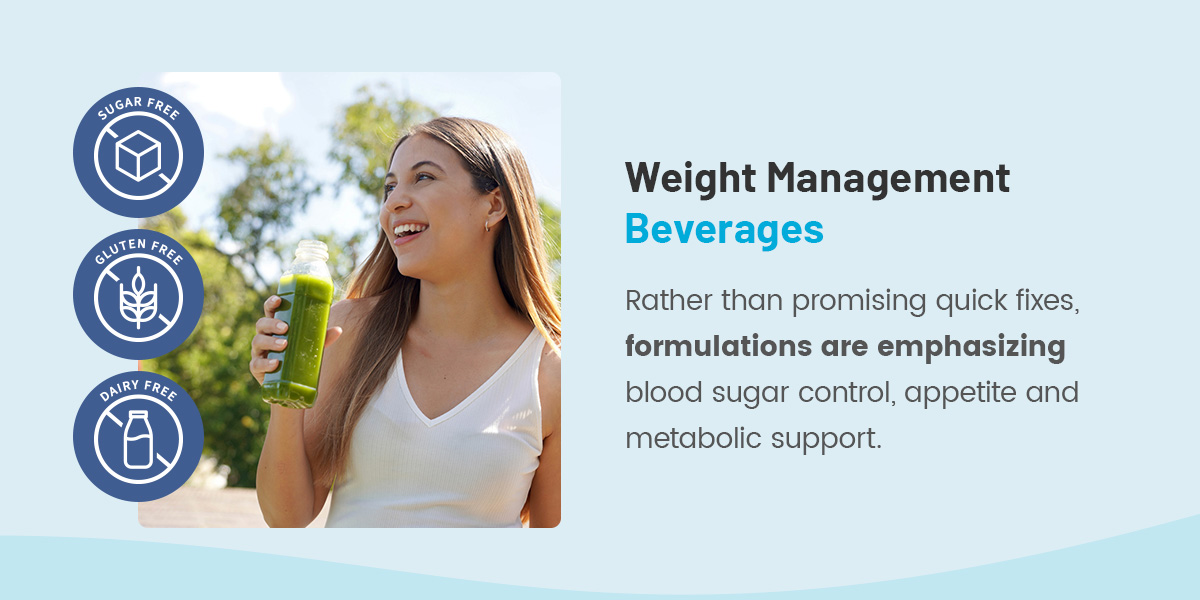
Weight management beverages are moving away from restrictive diet culture. Rather than promising quick fixes, formulations are emphasizing blood sugar control, appetite and metabolic support. This balance comes from using natural fibers and plant proteins. This shift frames weight management as part of holistic wellness.
Social media is amplifying consumer backlash against outdated diet culture, making room for beverages positioned around wellness and performance instead of deprivation. Examples include protein-enriched smoothies and green-tea-based RTDs focusing on metabolic support. Products that respect women's health goals while avoiding stigmatizing narratives can build trust and loyalty in a space long criticized for overpromising and underdelivering.
Mapping Needs to Ingredients, Flavors and Formats
Each of these women's wellness trends translates into specific ingredient choices, flavor profiles and delivery formats. Understanding these connections helps beverage developers move from broad consumer insights to actionable product concepts.
By mapping preferences to tangible formulation options, brands can accelerate R&D, reduce risk and develop drinks that align with their target market's expectations from the first sip to repeat purchase.
| Women's Health Need | Key Functional Ingredient(s) | Formulation Watch-Outs | Example Flavor and Format |
| Bone Health and Healthy Aging | Calcium, vitamin D, magnesium | Mineral precipitation, chalkiness | Vanilla and citrus; Protein shakes; Fortified waters |
| Energy and Focus | Green tea extract, yerba mate, L-theanine, B-vitamins | Caffeine limits (under 200mg a day during pregnancy) | Citrus berry; RTD coffee and teas; Shots |
| Hair, Skin and Nails | Collagen peptides, vitamin C | Collagen solubility, clarity | Berry, citrus and green tea; Sparkling teas; Flavored waters |
| Gut Health | Prebiotics, probiotics, postbiotics | Heat, pH stability | Ginger and lemon; RTD sodas; Kombucha; Kefir waters |
| Stress Support | L-theanine, magnesium, adaptogens | Solubility, taste masking | Lavender and hibiscus; Sparkling tonics and nonalcoholic aperitifs |
| Prenatal and Postnatal Support | Folate, iron, DHA, choline | Taste masking, stability | Citrus, berry and light tropicals; Prenatal shakes; Fortified waters; Powders |
| Hydration and Wellness | Electrolytes, coconut water | Sweetness levels, clean label expectations | Tropical and citrus; Sparkling waters; Stick packs; Sports drinks |
| Sleep and Relaxation | L-theanine, GABA, melatonin, tart cherry | Flavor masking, solubility, stability | Chamomile and honey; RTD teas and shots; Stick packs |
How to Launch and Scale a Women's Wellness Beverage Brand
Turning an idea into a successful women's wellness beverage requires strategic planning. Brands must translate consumer insights into credible, enjoyable products and then bring them to market with precision. Here are priorities to incorporate into a foundation for growth:
- Authenticity and a strong brand narrative: Women expect transparency regarding why a product exists, what ingredients are included and what the product does. Clear purpose and transparent communication establish trust and differentiation in a crowded field.
- Niche target: Broad claims are impersonal. Winning brands focus on a specific benefit for a well-defined audience, such as postpartum recovery or perimenopause, and allow for tailored messaging and stronger loyalty. Precision targeting drives stronger engagement.
- Science-backed ingredients: Use clinically supported dosages and reliable suppliers to ensure efficacy and compliance. Companies providing clear information, reference research and label transparency are more likely to earn repeat business and consumer trust.
- Partner with experts: Collaboration with experienced formulators, regulatory specialists and manufacturing partners reduces risk and accelerates timelines. Ensure your claims and labeling comply with FDA and FTC requirements to add credibility that resonates with retailers and consumers.
- Go-to-market and distribution: Start small and scale the strategy strategically. Consider launching in niche retail environments, such as wellness centers, yoga studios and specialty grocers, or build a direct-to-consumer channel to gather feedback and build a community before approaching national retailers.
- Disruptive formats and packaging: Innovative formats or sustainable packaging can capture attention and support premium positioning. The format should align with the target consumer's lifestyle.
- Flavor as a non-negotiable: Functional benefits only matter if consumers enjoy the taste. Consumers today expect indulgence with purpose — flavors that feel natural, adventurous and aligned with lifestyle values, making flavor innovation a critical pillar alongside function in successful beverage development. Consider sensory testing prior to launch.
Accelerate Your Women's Wellness Beverage Brand With BevSource
Women's wellness beverages represent one of the most dynamic areas of functional product development. Even energy drinks for women are evolving beyond high-caffeine formulas, focusing on balanced energy, mood support and clean ingredients.
Understanding consumer expectations, using science-backed ingredients and aligning with life-stage needs develop opportunities for meaningful differentiation. Companies that combine technical expertise and authentic communication are best positioned to lead this evolving category.
BevSource can help you navigate this complex landscape with expert formulation, ingredient sourcing and full-service development support from concept to commercial production. We have over 20 years of success, helping startups and scaling brands by sharing our expertise and relationships. Our services include flexible support for your brand at any stage.
Get in touch with our team today to accelerate your brand's growth in women's beverages.
